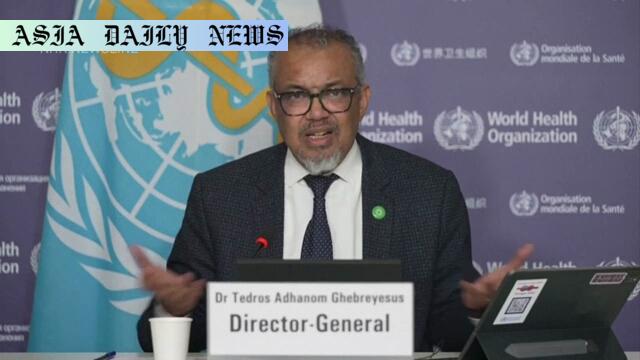Funding: WHO Director-General calls for US to restore aid, citing serious impacts on global infectious disease responses.
- The WHO Director-General urges the US to restore foreign aid funding to combat infectious diseases.
- The suspension affects services for HIV, polio, and other infectious diseases, especially in 50 countries.
- The WHO is addressing concerns through reforms, including a proposal for a new funding mechanism to reduce US financial contributions.

Introduction
The World Health Organization (WHO) has raised serious concerns regarding the suspension of US foreign aid funding. The directive, initiated under an executive order by US President Donald Trump, is deeply impacting global efforts to combat infectious diseases such as HIV and polio. WHO Director-General Tedros Adhanom Ghebreyesus has called for the United States to reconsider its stance, emphasizing the severe repercussions on health services and disease prevention programs in over 50 countries.
US Funding Suspension and Its Global Impact
The executive order signed by President Trump halts foreign aid programs for 90 days, except for specific exemptions. The State Department and the US Agency for International Development (USAID) have temporarily ceased funding international health initiatives, including substantial contributions to the WHO. This decision has disrupted essential programs aimed at managing infectious diseases worldwide. For instance, critical services such as HIV testing, prevention, and treatment have been slowed or stopped completely in many nations, particularly those heavily reliant on US-led initiatives like the President’s Emergency Plan for AIDS Relief (PEPFAR).
HIV, Polio, and Other Infectious Disease Challenges
The interruption in funding has had a cascading effect on vital health interventions. WHO’s HIV/AIDS relief program, covering fifty countries, experienced significant setbacks, with some programs completely pausing operations. Additionally, ongoing efforts to eradicate polio on a global scale have suffered delays, jeopardizing progress made over decades. Without sufficient financial resources, the risk of infectious disease outbreaks escalates, threatening public health worldwide.
WHO’s Response and Proposed Reforms
In response to the crisis, the WHO has proposed implementing reforms to alleviate the financial burden on the United States. Tedros announced possible measures, such as establishing a new funding mechanism tailored to reduce dependency on American resources while sustaining critical health initiatives. He reiterated the significance of multilateral cooperation and appealed to other nations to amplify their contributions to safeguard global health security.
The Importance of Collective Global Health Leadership
Health experts stress that collaborative international efforts are essential for managing and eradicating infectious diseases. The suspension of US foreign aid hampers not only disease response missions but also undermines the leadership role of the United States in global health governance. Critics of the decision argue it could lead to long-term repercussions, weakening trust in multilateral institutions like the WHO and risking future pandemics without adequate infrastructure or preparedness.
A Call to Reaffirm Global Commitments
Tedros’s appeal to President Trump also highlights the moral and strategic responsibility of wealthier nations in supporting vulnerable populations. Advocates argue that investing in global health fosters diplomacy, economic stability, and humanitarian progress, adding value well beyond the immediate benefits of disease response. The establishment of a sustainable and equitable financial model remains imperative to ensure the continuity of programs essential to global health.
Conclusion
The suspension of US foreign aid funding has triggered a crisis in the global fight against infectious diseases. As the WHO tackles these unprecedented challenges, it is clear that maintaining international collaboration and equitable funding mechanisms is indispensable. The United States, along with other nations, must remain committed to ensuring the health and well-being of millions worldwide by supporting programs that protect against the devastating impact of diseases like HIV and polio. The road ahead calls for thoughtful reform, proactive cooperation, and the prioritization of global health security.



Commentary
The Broader Impact on Global Health
The decision by the United States to suspend foreign aid funding not only disrupts short-term infectious disease responses but also poses a significant challenge to long-term global health strategies. WHO’s programs, which directly support some of the most vulnerable populations in the world, rely on stable and consistent funding. The disruption caused by this pause highlights the fragility of international health systems when overly dependent on a single donor country.
The Risk of Reverting Progress
Programs like those aimed at eradicating HIV and Polio have taken decades of work and billions of dollars to progress. However, this recent funding suspension risks undoing years of advancement in these fields. Resurgence of infectious diseases not only endangers lives but could also place a massive financial burden on global healthcare infrastructure in the future. Prevention is always more cost-effective than dealing with full-blown outbreaks.
A Call to Action
This situation calls for a renewed focus on shared responsibility. While the WHO contemplates reforms to distribute financial responsibilities more evenly, other nations must recognize their roles in this collective effort. The US, as a historically significant contributor to global health, should reconsider its stance for the sake of humanitarian and strategic interests. Simultaneously, the establishment of diversified funding frameworks would make international health efforts more resilient in the face of future uncertainties.
Ultimately, global health is a shared challenge that requires dependable partnerships and commitments. Ensuring sustained support for these efforts is a moral imperative and an investment in a safer, healthier world for all.